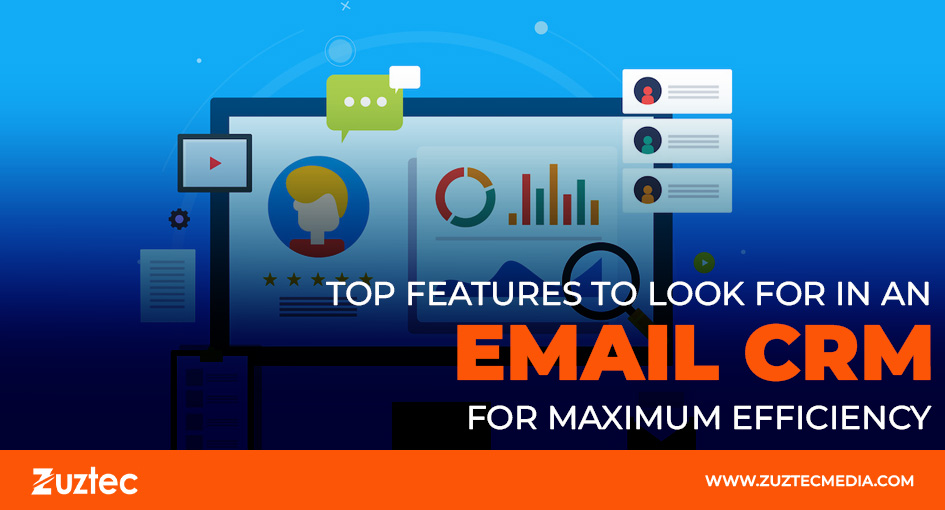
Top Features to Look for in an Email CRM for Maximum Efficiency
Customer relationships are at the core of success in today’s fast-paced business landscape. Companies need seamless communication and organization to build long-term customer loyalty, drive conversions, and streamline workflows. This is where email CRM (customer relationship management) solutions come into play. An effective email marketing CRM system helps businesses manage customer interactions, automate marketing campaigns, track engagement, and enhance customer support. However, with the vast array of email marketing CRM software available in the market, choosing the right one can be overwhelming. Businesses must consider various factors to ensure they invest in a solution that maximizes efficiency, improves collaboration, and delivers measurable results.
The right email marketing CRM should offer features that align with the company’s goals, from automation and integration capabilities to analytics and personalization. A well-optimized system allows businesses to nurture leads, maintain organized customer data, and send targeted emails at the right time. Whether someone is a small business or a large enterprise, selecting an email marketing CRM with essential features will ensure seamless operations and increased productivity. In this article, we’ll explore the top features to look for in an email marketing CRM that can drive maximum efficiency for the business. By understanding these key elements, an individual will be able to make an informed decision when choosing the best CRM platform for their needs.
Essential Features to Consider in an Email CRM
1. Automation for Email Marketing
One of the most essential features of an email marketing CRM is automation. Email automation allows businesses to send personalized and timely emails without manual intervention. Workflows that are automated can be configured to:
- Send welcome emails to new subscribers
- Follow up with potential leads
- Re-engage inactive customers
- Send promotional or reminder emails based on user behavior
This feature not only saves time but also ensures consistent communication with prospects and customers.
2. Integration with Other Tools
A good email marketing CRM should easily integrate with other business tools such as:
- E-commerce platforms (Shopify, WooCommerce)
- Marketing automation software (HubSpot, Mailchimp)
- Customer support tools (Zendesk, Freshdesk)
- Social media platforms (Facebook, LinkedIn)
Seamless integration enables businesses to sync data, track interactions, and create a unified customer experience across multiple channels.
3. Advanced Segmentation and Personalization
Modern email marketing CRM systems should allow businesses to segment their audience based on criteria such as:
- Purchase history
- Engagement levels
- Demographics
- Behavior on your website
With advanced segmentation, businesses can send highly targeted emails that resonate with their audience, resulting in better open rates, click-through rates, and conversions.
4. Analytics and Reporting
To measure the effectiveness of your email campaigns, an email CRM must provide:
- Email open and click-through rates
- Conversion tracking
- A/B testing results
- Customer engagement insights
These analytics help businesses refine their strategies, optimize content, and ensure that they are sending the right message to the right audience at the right time.
5. Lead Scoring and Management
A robust email marketing CRM should offer lead scoring to prioritize potential customers based on their engagement level. With lead management tools, businesses can:
- Track the customer journey
- Identify high-value prospects
- Assign leads to sales teams for follow-ups
- Increase sales conversions
By focusing on the most promising leads, companies can improve efficiency and maximize revenue.
6. User-Friendly Interface and Ease of Use
An intuitive email marketing CRM dashboard makes it easy for teams to:
- Navigate the platform effortlessly
- Manage contacts and communication efficiently
- Set up email campaigns without technical expertise
A clutter-free interface ensures that both beginners and experienced users can leverage the CRM’s features without a steep learning curve.
7. Mobile Accessibility
In today’s digital world, businesses need the flexibility to manage customer relationships on the go. A mobile-friendly email CRM ensures that teams can:
- Check emails and customer data from their smartphones
- Track campaign performance in real time
- Respond to leads and customers without delays
Mobile accessibility enhances productivity and ensures businesses stay connected no matter where they are.
8. Robust Security and Data Privacy Compliance
With increasing concerns about data breaches and compliance regulations, businesses need an email marketing CRM that:
- Offers data encryption and security measures
- Complies with GDPR, CCPA, and other regulations
- Provides role-based access control to protect sensitive customer data
A secure CRM ensures customer trust and minimizes legal risks.
Why Choosing the Right Email CRM Matters
Selecting the right email marketing CRM is crucial for businesses aiming to streamline customer communication, automate email marketing, and enhance engagement. A powerful email marketing CRM enables companies to manage contacts efficiently, segment audiences, and send personalized emails that drive conversions. It also integrates with other business tools, ensuring seamless workflow across sales and marketing teams. With advanced analytics, businesses can track campaign performance and optimize their strategies. Investing in a feature-rich email marketing CRM helps save time, improve customer retention, and boost overall productivity, making it an essential tool for any business looking to grow and succeed.
conclude, selecting the right email CRM is crucial for maximizing efficiency, streamlining communication, and enhancing customer relationships. The best email marketing CRM software should offer automation, integration, segmentation, analytics, lead management, and security features to ensure seamless business operations. By investing in a feature-rich CRM, businesses can improve engagement, boost conversions, and build lasting customer relationships. Whether you’re a startup or a large enterprise, evaluating these essential features will help you choose the right CRM tailored to your business needs. Staying ahead in a competitive market requires leveraging technology to its full potential. A well-optimized email marketing CRM will not only save time and resources but also ensure your business delivers highly targeted, personalized, and result-driven email campaigns.

